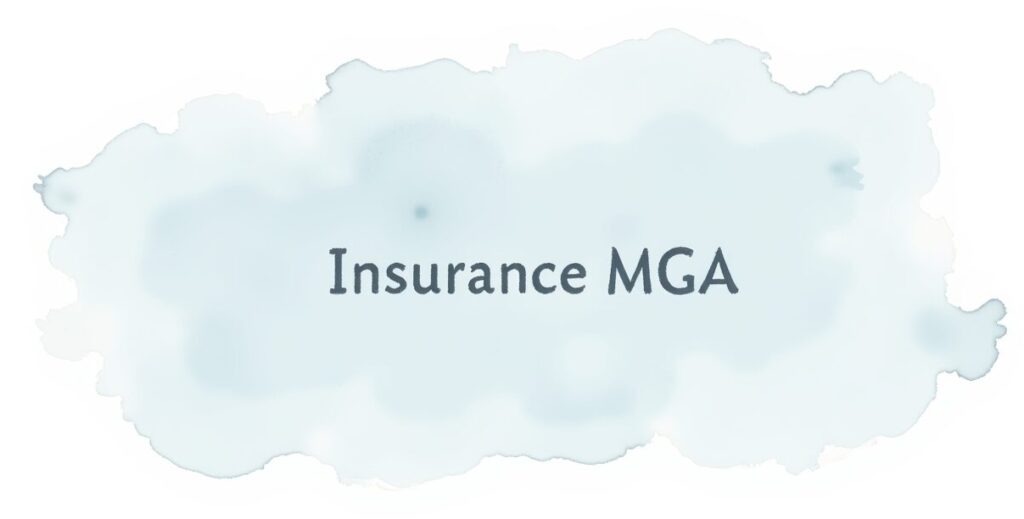Introduction to Insurance MGAs

The insurance industry continues to evolve at an unprecedented pace, and managing general agencies (MGAs) have positioned themselves as critical intermediaries driving innovation and efficiency. With over $80 billion in premium volume flowing through these specialized entities annually in the United States, they’ve become cornerstone players in modern distribution networks. For insurance professionals navigating today’s complex marketplace, understanding how these agencies operate and their strategic value proposition represents more than industry knowledge—it’s a competitive advantage.
What is an Insurance MGA?
An insurance MGA definition encompasses a specialized intermediary authorized by carriers to perform specific underwriting and administrative functions on their behalf. Unlike traditional insurance brokers who facilitate transactions, a managing general agency possesses delegated authority to bind coverage, issue policies, and often handle claims processing within predetermined parameters.
The MGA definition extends beyond simple brokerage functions. These entities serve as extensions of carriers’ underwriting departments, equipped with specialized expertise in particular lines of business or geographic markets. A managing general agent typically focuses on specific niches—whether that’s crop insurance in agricultural regions, specialty insurance for emerging risks, or property and casualty lines in targeted markets.
What distinguishes an MGA in insurance from other intermediaries is their dual role: they function simultaneously as underwriters and distributors. This unique positioning allows these agencies to make underwriting decisions, issue contracts, and manage policy administration while maintaining direct relationships with both capacity providers and retail distribution networks.
Consider a practical example: A technology-focused managing general underwriter specializing in cyber liability coverage can evaluate risks, bind policies up to $5 million limits, and issue certificates—all within hours rather than the weeks traditionally required when submissions flow through multiple intermediaries. This efficiency stems from their authority and specialized expertise.

The Function of Managing Agents
Managing agents serve multiple critical functions within the insurance ecosystem, each designed to bridge gaps between carriers seeking market penetration and distribution partners requiring specialized products or services.
Delegated Authority
Delegated authority represents the cornerstone of their model, empowering these entities to act on behalf of carriers within carefully defined parameters. This authority typically encompasses underwriting decisions, policy issuance, premium collection, and claims handling—functions traditionally reserved for direct operations.
The scope of this authority varies significantly based on the carrier relationship, line of business, and the agency’s demonstrated expertise. A well-established operation might possess binding authority up to $10 million for commercial property risks, while a newer entrant in specialty lines might be limited to $500,000. These limits are established through comprehensive underwriting guidelines that define acceptable parameters, pricing models, and coverage options.
This framework benefits all parties involved. Insurance carriers can access specialized markets without establishing dedicated underwriting teams or regional offices. Meanwhile, retail brokers and independent agents gain access to specialized products and expedited decision-making processes that would otherwise be unavailable or prohibitively slow.
From a practical standpoint, this means a commercial insurance broker working with a client requiring specialized transactional liability coverage can receive binding authority and policy documents within 24-48 hours through an agency, compared to potentially weeks through traditional markets.
Underwriting and Policy Issuance
The underwriting function performed by these agencies represents one of their most valuable contributions to the distribution chain. Unlike wholesale brokers who primarily facilitate submissions, they possess technical capabilities and make binding coverage decisions within their assigned authority levels.
Modern operations typically employ sophisticated risk assessment technologies and maintain detailed databases of loss experience within their specialty areas. An entity focusing on pet insurance, for instance, maintains actuarial data on breed-specific health trends, regional veterinary costs, and claims frequency patterns that inform their underwriting decisions.
Policy issuance through these agencies streamlines what was historically a complex, multi-step process. Once an underwriting decision is made, they can generate contracts, certificates, and endorsements through integrated technology solutions. This capability proves particularly valuable in time-sensitive situations—such as real estate closings requiring immediate proof of coverage or commercial risks needing immediate binding pending detailed underwriting review.
The quality of underwriting performed directly impacts their relationships with capacity providers. Successful operations maintain combined ratios competitive with direct markets while providing superior service levels. Those consistently producing profitable business often see their underwriting authority expanded, while those with poor loss experience face reduced limits or terminated relationships.
The Benefits of Working with an MGA Insurance Company

The strategic advantages of partnering with these agencies extend across multiple stakeholder groups, each realizing distinct benefits that traditional distribution channels struggle to replicate.
For Insurers
Insurance carriers increasingly view partnerships with these agencies as strategic growth vehicles that provide market access without significant capital investment or operational complexity. Rather than establishing regional offices or hiring specialized underwriting staff, carriers can leverage their expertise to penetrate niche markets or geographic regions efficiently.
These agencies offer carriers access to specialized distribution networks that would take years to develop independently. A carrier seeking to write surplus lines business in environmentally sensitive industries can partner with an established operation possessing existing relationships with wholesale brokers, environmental consultants, and industry associations.
The financial benefits for insurance carriers include reduced operational overhead, faster market entry, and improved loss ratios through specialized expertise. These agencies typically assume responsibility for policy administration, claims management, and regulatory compliance within their assigned territories or lines of business, reducing carriers’ administrative burden while maintaining underwriting control through carefully structured agreements.
Risk distribution represents another significant advantage. By working with multiple agencies across different geographic regions or specialty lines, carriers can achieve portfolio diversification without direct market development costs. This approach allows carriers to test new markets or products with limited capital commitment while retaining the ability to scale successful programs.
For Insurance Agents
Independent agents and retail brokers benefit from these partnerships through expanded product offerings, enhanced service capabilities, and improved client retention rates. Rather than maintaining relationships with dozens of insurance carriers, agents can access multiple markets through established agencies who handle the administrative complexity of carrier relationships.
Service enhancements represent a critical competitive advantage. These agencies typically provide agents with technology solutions for quoting, binding, and servicing policies that individual agents could not access independently. These platforms often include real-time quoting capabilities, electronic document delivery, and integrated claims reporting—features that improve client satisfaction and agent efficiency.
Product specialization available through these agencies allows retail agents to serve clients with complex or unusual risks that admitted carriers might decline. An independent agent working with a client requiring specialty coverage for drone operations, for example, can access markets through agencies specializing in emerging risks that would be unavailable through traditional channels.
The financial benefits include higher commission rates on specialty business, reduced errors and omissions exposure through improved documentation and compliance, and enhanced client retention through expanded product offerings and superior service delivery.
The Impact of Technology on Insurance MGAs
Technology has fundamentally transformed the operational capabilities and market positioning of modern agencies. Digital transformation within the MGA business model extends far beyond basic automation to encompass sophisticated risk identification, predictive analytics, and seamless integration across the value chain.
Contemporary agencies leverage artificial intelligence and machine learning algorithms to improve underwriting decisions and identify emerging risk patterns. These technology solutions enable them to process applications more quickly while maintaining or improving risk selection quality. For example, an agency specializing in commercial property risks might use satellite imagery and weather pattern analysis to assess property conditions and catastrophic exposure more accurately than traditional inspection methods.
Integration capabilities represent another technological advantage. Modern operations utilize application programming interfaces (APIs) to connect seamlessly with carrier systems, agent management platforms, and third-party data providers. This integration eliminates manual data entry, reduces processing errors, and provides real-time status updates to all parties involved in the transaction.
Cloud-based platforms have enabled smaller operations to access sophisticated capabilities previously available only to large operations. Policy management, claims processing, and accounting functions can now be handled through scalable software solutions that grow with the business while maintaining security and compliance standards required by insurance carriers and regulatory authorities.
The competitive advantage provided by technology extends to data analytics and business intelligence. Successful operations use their transaction data to identify market trends, optimize pricing models, and develop new products or coverage options that address emerging market needs.
Trends in the MGA Market

The sector continues to experience significant evolution driven by changing market conditions, technological advancement, and shifting client expectations. Understanding these trends provides insurance professionals with insights into future market opportunities and competitive positioning.
Growth of Digital MGAs
Digital agencies represent the fastest-growing segment within the space, combining traditional capabilities with technology-first approaches to distribution and service delivery. These entities leverage advanced analytics, automated underwriting, and digital customer interfaces to serve market segments previously considered unprofitable or too complex for traditional distribution methods.
The digital transformation has lowered barriers to entry for new operations while enabling existing ones to scale more efficiently. Startups can now launch operations with significantly reduced capital requirements by utilizing cloud-based technology platforms and accessing reinsurance capacity through established fronting insurers.
Customer expectations drive much of this digital evolution. Commercial insurance buyers increasingly expect the same service levels they receive in personal lines—immediate quotes, online policy management, and digital claims reporting. These digital operations can meet these expectations while maintaining the specialized expertise and risk assessment capabilities required for commercial and specialty markets.
The London market has particularly embraced digital models as a means to access North American distribution while maintaining their specialized underwriting expertise. These cross-border partnerships combine European capital markets with American distribution networks through digital platforms that handle regulatory compliance and operational requirements seamlessly. In this context, these agencies often operate as coverholders, a term used in the London market for entities with authority.
Challenges Facing MGAs Today
Despite significant growth opportunities, these agencies face several challenges that impact their operational effectiveness and market positioning. Regulatory compliance complexity tops the list, as they must comply with regulations in every jurisdiction where they operate while maintaining compliance with their carrier partners’ requirements.
Balance sheet capacity management represents an ongoing challenge, particularly for agencies that assume financial responsibility for claims handling or maintain significant receivables from agents and insureds. The collapse of several large operations in recent years due to financial mismanagement has increased carrier scrutiny and regulatory oversight across the sector.
Technology investment requirements continue to escalate as client expectations increase and competitive pressures mount. These agencies must balance the cost of system development and maintenance against the need to remain competitive with digital operations and direct operations that may have superior technology budgets.
Talent acquisition and retention present ongoing challenges, particularly for specialized underwriting expertise and technology professionals. The competition for experienced underwriters familiar with both traditional principles and modern technology platforms has intensified compensation costs and complicated succession planning for many operations.
Capacity management represents another significant challenge as markets harden and reinsurance costs increase. These agencies must maintain relationships with multiple capacity providers while ensuring adequate limits are available for their distribution partners and clients.
Conclusion

The role of these specialized agencies in today’s market extends far beyond traditional intermediary functions to encompass specialized underwriting, technology-enabled distribution, and strategic market development. For professionals, understanding their capabilities and market positioning is critical for effective client service and business development.
The continued evolution of their model—driven by technology advancement, changing client expectations, and market dynamics—positions these entities as increasingly important players in distribution. Success in working with or competing against them requires understanding their operational capabilities, technological advantages, and strategic positioning within specific market segments.
As pension funds and other institutional investors increase their allocation to insurance-linked investments, and as emerging risks require specialized coverage solutions, the strategic importance of these agencies will continue to grow. Insurance professionals who understand how to leverage their capabilities effectively will find themselves better positioned to serve clients and capture market opportunities in an increasingly complex and competitive marketplace.
Frequently Asked Questions
Insurance MGAs (Managing General Agents) can be found through industry directories, trade associations like the Target Markets Program Administrators Association (TMPAA), wholesale broker networks, or by searching the National Association of Professional Surplus Lines Offices (NAPSLO) member lists.
Insurers use MGAs to expand distribution, enter niche markets, or outsource underwriting and servicing functions without the overhead of a full branch office.
MGAs often specialize in niche, complex, or hard-to-place risks such as professional liability, trucking, cyber, E&S property, or programs tailored to specific industries.
MGAs typically earn a commission or fee from the carrier based on premium volume, and may also charge policy fees or retain a portion of underwriting profits through profit-sharing agreements.
MGAs often have delegated authority from insurers to underwrite, bind coverage, issue policies, collect premiums, and sometimes handle claims.
Using an MGA gives agents access to specialized markets, underwriting expertise, and customized insurance programs not typically available through standard carriers.
